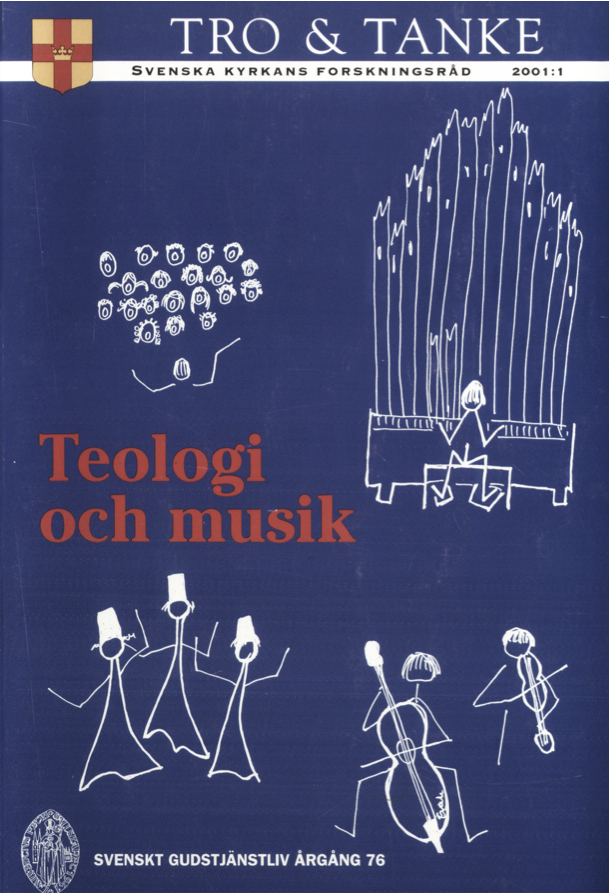Klingande sakrament Augustinska och aktuella teologiska perspektiv på musik
Abstract
In this article, I discuss some recent attempts at applying a Christian theological perspective on music, mainly by Scandinavian authors (for titles, see footnotes). Since, however, several of these authors give historical exposés commenting for instance on Augustine, one of my own special objects of research, I begin with giving a renewed analysis of his views.
Augustine had assimilated the Pythagorean theory of musical harmony as a reflection of the harmony of the Universe and gave this a Christian interpretation. Music is understood as a divine gift, which gives us the possibility of acquiring knowledge of God the Creator. This theory was influential in Europe as late as the 18th century but was then gradually replaced by a view where music was seen as expressing subjective human feelings. The development is clearly elucidated in the book by Nils Holger Petersen. He also describes it as an ongoing process of secularization. This could appear as wholly negative from a theological perspective, hut Petersen stresses that the present situation is above all characterized by musical pluralism, which in itself offers good possibilities for renewed attempts at combining music with Christian faith. I am critical of the classical harmony theories, nor am I content with a strictly subjective view of music. I will rather consider music as giving us experiences of a reality otherwise unattainable.
Augustine’s theory of music is certainly antiquated, hut his practical recommendations of music in the Christian liturgy are of current interest still. However, presentations of his view in general have built on too sparse and one-sided material, mainly using a passage in Confessiones X,33, which is part of a rigorous self-examination. Augustine there points out that the beauty of the musical sound can sometimes draw the attention from the religious contents of the words of the song. This is an important insight, even now to he taken seriously—hut building on this passage only can give the impression that Augustine has a most reserved recognition of music in the Christian liturgy, which is not at all the case. For a Christian congregation nothing can he more useful and holy than singing psalms together, he assures us in another context. And even if the main rule is that music should he the servant of the Biblical text, Augustine also stresses the word less musical jubilation as a worthy expression of ecstatic feelings for which no adequate words can he found. The positive evaluation of music in Catholic and Lutheran traditions is undoubtedly an inheritance from Augustine.
Henrik Tobin has written a most learned book giving much detailed historical information, with emphasis on music within the two main evangelical traditions. Being one of the modem authors discussed here, Tobin is the one who shows the greatest sympathy for classical harmony theories, stressing the connection of musical harmony, both with the harmony of the Universe and with the harmonic relation between the three persons of the Christian Godhead. Personally, I find oldish reflections like these neither quite tenable nor theologically fruitful.
Anders Ekenberg is much more restrained than Tobin in his theological reflections on music, mainly stressing music as a gift of God, belonging to the domaine of the creation. He has, however, formed the concept of “sonorous sacrament”, using a more original meaning of the word “sacrament” than in later teachings of the seven, three, or two Sacraments of the Church. “Sacrament” here means an outwardly visible or audible sign of an inner spiritual reality. I find the concept extremely fruitful (making use of it in the heading of my own essay), mainly because it shows that music is an essentially different means of expression than the written or spoken word.
Per Lönning, finally, has written a provocative essay in which he turns the conventional relation between theology and music upside down: instead of making music the object of theological reflection, he sets out to show “how authentic Christian theology must be oriented— restlessly— by sacred mu sic”. The main points of the argument are that (1) the song of praise is a basic element in Christian existence, and that (2) orientating theology to wards this insight may liberate us from the belief that our words can express the essence of God; God is “the Unspeakable”. I think that the conclusion here, though reached through a different kind of argument, coincides rather well with Ekenberg’s proposal of conceiving music as the “sonorous sacrament”.
Downloads
Publicerad
Nummer
Sektion
Licens
© författarna, Laurentius Petri Sällskapet för svenskt gudstjänstliv samt Artos & Norma bokförlag. Det är tillåtet att kopiera och använda material ur Svenskt Gudstjänstliv för forskningsändamål om källan anges. För övriga ändamål kontakta respektive artikelförfattare samt förlaget. Särskilda restriktioner kan gälla för bildmaterial.


